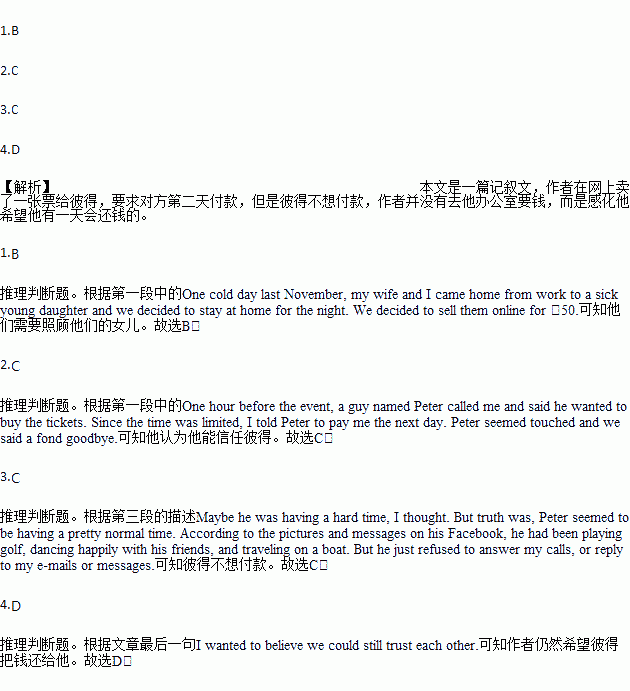题目内容
One cold day last November, my wife and I came home from work to a sick young daughter and we decided to stay at home for the night. Problem was, we had two tickets to see Miranda July, the performance artist, being interviewed at the Herbst Theatre. We decided to sell them online for $50. One hour before the event, a guy named Peter called me and said he wanted to buy the tickets. Since the time was limited, I told Peter to pay me the next day. Peter seemed touched and we said a fond goodbye.
However, a month later, Peter still didn’t pay me back. A few more weeks passed. Another month. There’d been one e-mail promising to mail the check, then silence.
Maybe he was having a hard time, I thought. But truth was, Peter seemed to be having a pretty normal time. According to the pictures and messages on his Facebook, he had been playing golf, dancing happily with his friends, and traveling on a boat. But he just refused to answer my calls, or reply to my e-mails or messages. So I tried reaching him with my wife’s phone one night. And he didn’t pick up when I called,but texted right back, playfully wondering who might be calling him.
“You should go to his office,”my wife said, “He would have to give you the money if all his coworkers were watching.”
But I didn’t want to become a debt collector. My efforts to reach Peter over these months had been light and I wanted to keep it that way. My initial exchange with Peter had been just two regular people agreeing to handle things humanly. There was a rare niceness in that, and I still wanted to keep that balloon in the air, however disappointing it was starting to look. I wanted to believe we could still trust each other.
1.For what reason did the author and his wife decide to sell the ticket?
A. They thought it was too cold that night.
B. They needed to look after their daughter.
C. They wanted to save some money.
D. They were going to be interviewed.
2.On the night the author sold his tickets to Peter, he .
A. knew he might not get the $50. B. felt a little hesitant.
C. thought he could trust Peter. D. was moved by Peter’s kindness.
3.Why didn’t Peter pay the author back?
A. Because he didn’t remember it. B. Because he was too busy to pay.
C. Because he didn’t want to pay. D. Because he was having a tough time.
4.What can we infer about the author?
A. He would never trust strangers.
B. He might call the police for help.
C. He would go to Peter’s office to talk to him.
D. He still hoped Peter would pay him back.

